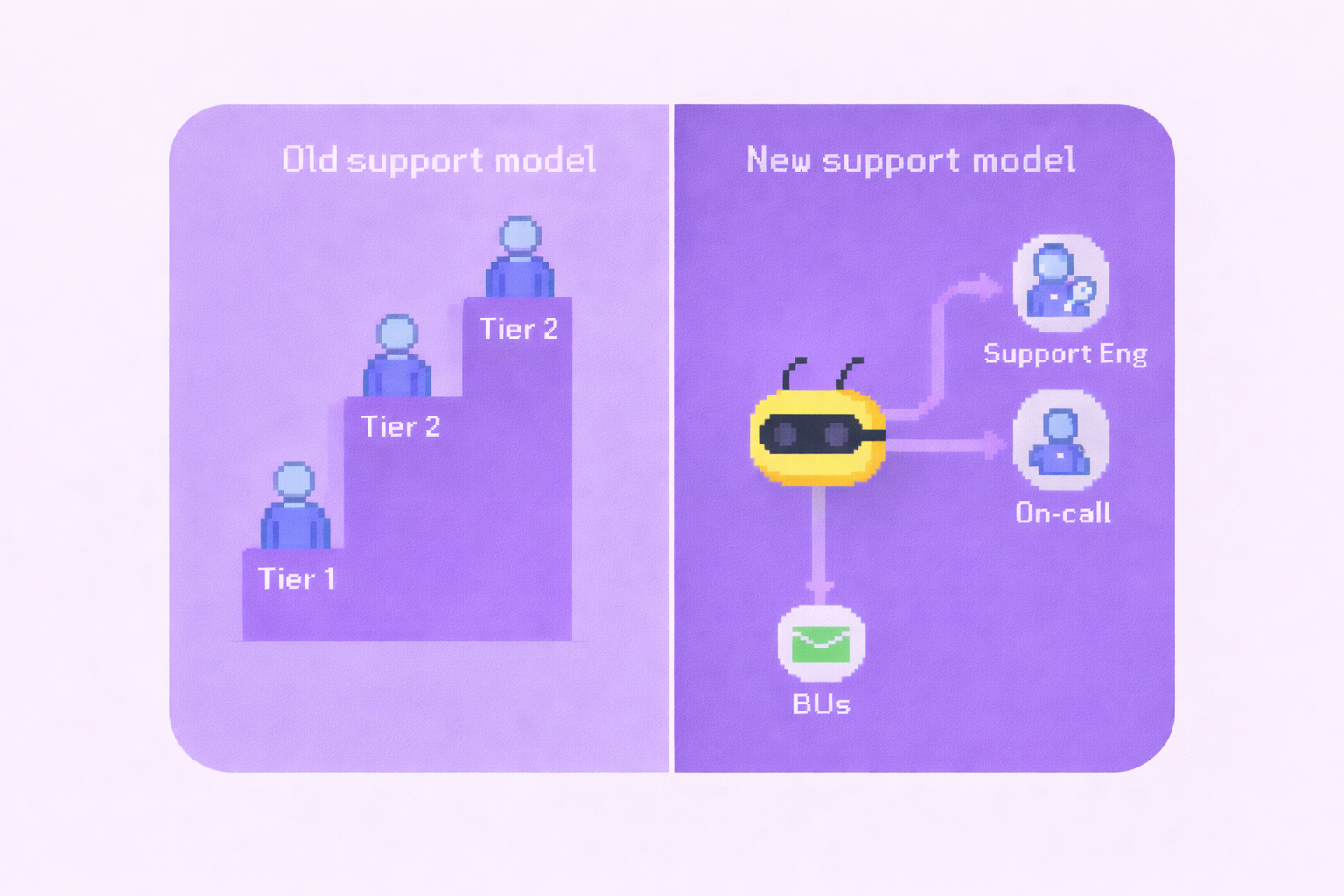8 Meaningful Ways to Celebrate Black History Month at Work

For those in the United States, it’s fairly common for schools to recognize Black History Month. But as we get older, mandated education and celebration of African American history is less common. This is a lost opportunity—and it also doesn’t help that February is a short month.
But Black History Month was, and remains, a key (although imperfect) way of celebrating and acknowledging everything that Black Americans have created, innovated, and inspired.
As President Gerald Ford said in 1976 when he officially recognized Black History Month, we need to “seize the opportunity to honor the too-often neglected accomplishments of black Americans in every area of endeavor throughout our history.”
This includes in the workplace.
Why do we celebrate Black History Month?
Black History Month actually started as Negro History Week in 1917. Author, journalist, and historian Carter G. Woodson—now appropriately recognized as the “father of black history”—lobbied vigorously for the national recognition of Black stories and perspectives. Woodson believed deeply that equality was only possible with the acknowledgment and understanding of a race’s history, and dedicated his life to the study of African American historical research.
“Since its inception, Black History Month has never been just a celebration of black America’s achievements and stories—it’s part of a deliberate political strategy to be recognized as equal citizens.” – Dr. Theodore R. Johnson
Woodson also hoped that the time would come when Black History Month would be unnecessary. Unfortunately, we have a long way to go.
So, how does this relate to the workplace? There’s a plethora of research that covers the racism, discrimination, and unfair treatment that Black employees face. This attitude persists despite the efforts of diversity initiatives.

Black History Month in today's world
Efforts like Black History Month and other efforts to increase DEI in organizations are facing a backlash. Pew Research found recently that fewer American workers think that efforts to increase DEI at work are a good thing (52% in November 2024, down from 56% in February 2023). They’re also more likely to say their company or organization pays too much attention to increasing DEI.
But the issues faced by Black people in the workplace aren’t going away in many organizations. There were significantly different workplace experiences across race/ethnicity groups at 39% of companies, according to Glassdoor research.
As DEI programs and initiatives face pushback from both individual activists and portions of the government, it’s more critical than ever for HR professionals to set the standard of how to eradicate discrimination and bias—conscious and unconscious—and, in the process, encourage the inclusion of all employees.
Recognizing and celebrating deep-level diversity characteristics can be effective in creating a culture of inclusion and belonging. Thus, celebrating Black History Month in the workplace is an excellent way to achieve that goal.
“Let truth destroy the dividing prejudice of nationality and teach universal love without distinction of race, merit or rank.”
–Carter G. Woodson
How to celebrate Black History Month at work
Race in the workplace can be a difficult subject, and many organizations make misguided attempts at establishing equality.
In fact, when companies downplay demographic differences, this actually increases underrepresented employees’ perception of bias from their white colleagues and reduces engagement in their work. It can be seen as an attempt to avoid uncomfortable conversations, which are difficult but also important when trying to make real changes in the workplace.
So, best practice #1: Don’t be colorblind. Your employees should be able to openly discuss, embrace, and be proud of their cultural and ethnic backgrounds, and raise issues they face today as well.
With this in mind, let’s cover some other Black History Month best practices.
Make it a company-wide effort
In the spirit of inclusivity, everyone in your organization should be encouraged to participate with enthusiasm. It shouldn’t be the sole responsibility of Black employees to organize their own recognition, and you’ll find that it’s transformative to have employees of every background participating and learning during Black History Month.
It’s also critical to have your HR and executive leaders spearhead your Black History Month initiatives, partly because it takes the burden off your Black employees to celebrate themselves. It also demonstrates that your leadership is truly committed to inclusivity and equity, which is a powerful message.

Don’t single anyone out
Along the same lines, you shouldn’t assume that someone wants to be involved in your Black History Month planning simply because of their ethnic background. That places the burden of responsibility on them, and if they’re a visible minority at your workplace, they might feel tokenized about their role at your workplace—especially if this initiative is a new thing at your company. Remember, for best results, you should be recognizing all your employees, all year round.
--> Explore Bonusly: a recognition platform that builds connections and creates a sense of belonging.
Tackle racism meaningfully year-round
While Black History Month comes only once a year, the contributions of Black Americans are not any less relevant in the other 11 months of the calendar. Your organization should build in programs that help address racism and discrimination, and celebrate the accomplishments of Black people year-round (you can start by adding Juneteenth as a holiday if you don’t already celebrate it at work).
For example, Harvard Business Review research reveals that while 20% of white employees have a sponsor at work, just 5% of Black employees do, and this gap exists partly because Black people hold just 3% of corporate executive positions. Committing to building a formal or informal sponsorship program all year round can make significantly more of a difference in fighting racism than a once-a-year event.
Consider areas of growth
But wait!” you say, “What if my workplace doesn’t have Black employees, or isn’t very diverse at all?”
This is an important consideration as your HR team works to understand your organization’s areas of growth, and Black History Month is a great opportunity to do that. If you find your company lacking in its diversity, equity, and inclusion practices, why not take the time to examine your current recruiting, interviewing, and onboarding processes?
Chances are, your fellow team members will appreciate and welcome your efforts, and they will help your retention efforts as well. Despite progress, a 2023 Indeed study found that almost half (49%) of Black workers are currently considering or actively searching for a new job because they don’t feel supported at work and want to make a change.
Trust us, and decades of research: a diverse and inclusive workplace is worth the effort.
Now that we have those principles down, let’s dive into some ideas so you can put them into meaningful action.

Black History Month ideas for work
There’s always an opportunity to learn something insightful when you listen to a new perspective. From unconscious bias training to volunteering to an old-fashioned lecture from an expert, there are lots of ways to recognize Black History Month. Here are a few:
Education
1. Bring in speakers
Bring in influential authors, historians, or activists to speak to your employees about race relations, civil rights, and other critical topics surrounding Black identity.
Panel discussions allow for multiple speakers to bounce ideas around for a thorough conversation, while presentations can really highlight a speaker’s area of expertise. You can hold these talks online if not all your employees work together in one office. Whichever style your company goes with, it’s sure to be an engaging and thought-provoking experience.
2. Plan a workshop
While there’s usually still a main speaker or facilitator involved, workshops are unique in that participants are usually encouraged to be hands-on and think critically about what they’re learning (and to get a little uncomfortable potentially too—that’s how real growth and learning happens). You’ll be working, not just listening.
At Bonusly, we've done Paradigm’s Managing Unconscious Bias Workshop at our annual company retreat. While not directly related to Black History Month, this workshop will shed light on and address the issues many Black employees face in the workplace today.

3. Organize a book club
Reading nonfiction or fiction books by Black authors can be a poignant and meaningful way to recognize Black History Month. Bonus points if you bring in a facilitator to guide and make the most of your discussions. For starters, Oprah has a great list of her favorite books by Black authors that cover many time periods across US history.
Here’s a quick list of favorites from the Bonusly team:
Nonfiction
So You Want to Talk About Race by Ijeoma Oluo
Wayward Lives, Beautiful Experiments by Saidiya Hartman
The Fire This Time: A New Generation Speaks about Race, an anthology edited by Jesmyn Ward
Black in Blues: How a Color Tells the Story of My People by Imani Perry
Citizen: An American Lyric by Claudia Rankine
How to Be an Antiracist by Ibram X. Kendi
Fiction
Transcendent Kingdom by Yaa Gyasi
An American Marriage by Tayari Jones
Crook Manifesto by Colson Whitehead
Parable of the Sower by Octavia Butler
Service
4. Volunteer
Volunteering with local nonprofits and charities is an excellent way to help the community, bond with your team members, and even inspire engagement and motivation in the workplace.
Lending your support as an organization is uniquely powerful because you can bring a lot of helping hands to a project, but you can also form corporate partnerships and create lasting relationships by establishing internships, apprenticeships, or recruiting programs. Remote and hybrid teams can plan a day to volunteer simultaneously even if you’re not physically together.
You know your own community better than we do, but Black Girls CODE, National Society of Black Engineers, and My Brother’s Keeper Alliance are good places to start if you’re looking for national Black-led organizations!
5. Donate
Pool your resources together or arrange a fundraiser to support racial justice. Sometimes, the gift of money is the most impactful thing you can give to a charity, especially when it comes to education or legal funds. We recommend checking out The Sentencing Project, Thurgood Marshall College Fund, and the NAACP Defense and Educational Fund.
It’s also worth it to look into Historically-Black Colleges or Universities (HBCUs). Consider establishing a scholarship fund or even mentorship opportunities. This is a great option for remote and hybrid teams too.
Inclusion
6. Reflect
As we mentioned, Black History Month is a great time to think about your company’s current diversity and inclusion efforts and make changes as needed. Leadership that prioritizes inclusion in the workplace slash attrition rates by a staggering 50%, but 65% of employees don’t think their organizations are diverse and inclusive. There is always room to improve.
Don’t know where to start? We appreciate this quote:
“Remember that your organization and its people do not exist separately from the world, meaning that you need to pay attention to how world events might affect your employees.”
Be thoughtful: do you create safe spaces (both for employees who are in-person and remote) to discuss current events affecting your team members’ communities? Every organization and individual team member has different support needs, but showing you care and bringing these employees into the fold can hugely affect their sense of belonging and inclusion.
One of the best ways to foster inclusion is by seeking out and listening to the perspectives and opinions of those you’re trying to include. Reach out to Black leaders in your organization and get their input on how they would like to be recognized during Black History Month and beyond.

7. Collaborate
Take it a step further by establishing a diversity, equity, and inclusion committee at your organization. This act shows that your company is dedicated to making your team environment a better place, and encourages a free-flowing of ideas and feedback between employees and leadership.
8. Recognize
We firmly believe that employee recognition is crucial to building inclusive workplaces.
One way to ensure more people are recognized is to diversify the parties responsible for giving recognition. And by pairing inclusive rewards with that recognition, you can amplify its effects.
Considering that executive boards and leadership positions tend to be less diverse, the simple act of implementing a 360-degree peer recognition program at your workplace can make a big difference in your inclusion metrics.
--> Explore Bonusly: a recognition platform that builds connections and creates a sense of belonging.

Next steps
February is a short month, so if you want to implement Black History Month activities meaningfully and thoughtfully, start soon! 👏
Has this post sparked inspiration? Tell us in the comments below, or check out these additional resources from Bonusly:
- DEI at Work: 5 Best Practices and 3 Common Mistakes to Avoid
- 10 Diversity & Inclusion Statistics That Will Change How You Do Business
- It's Our Responsibility as HR Professionals to Address Racial Injustice
- Why Employee Recognition is Crucial to Inclusion
- Something for Everyone: The Benefits of Offering Inclusive Employee Rewards
This article was updated on February 3rd, 2025, by Kathleen O'Donnell







